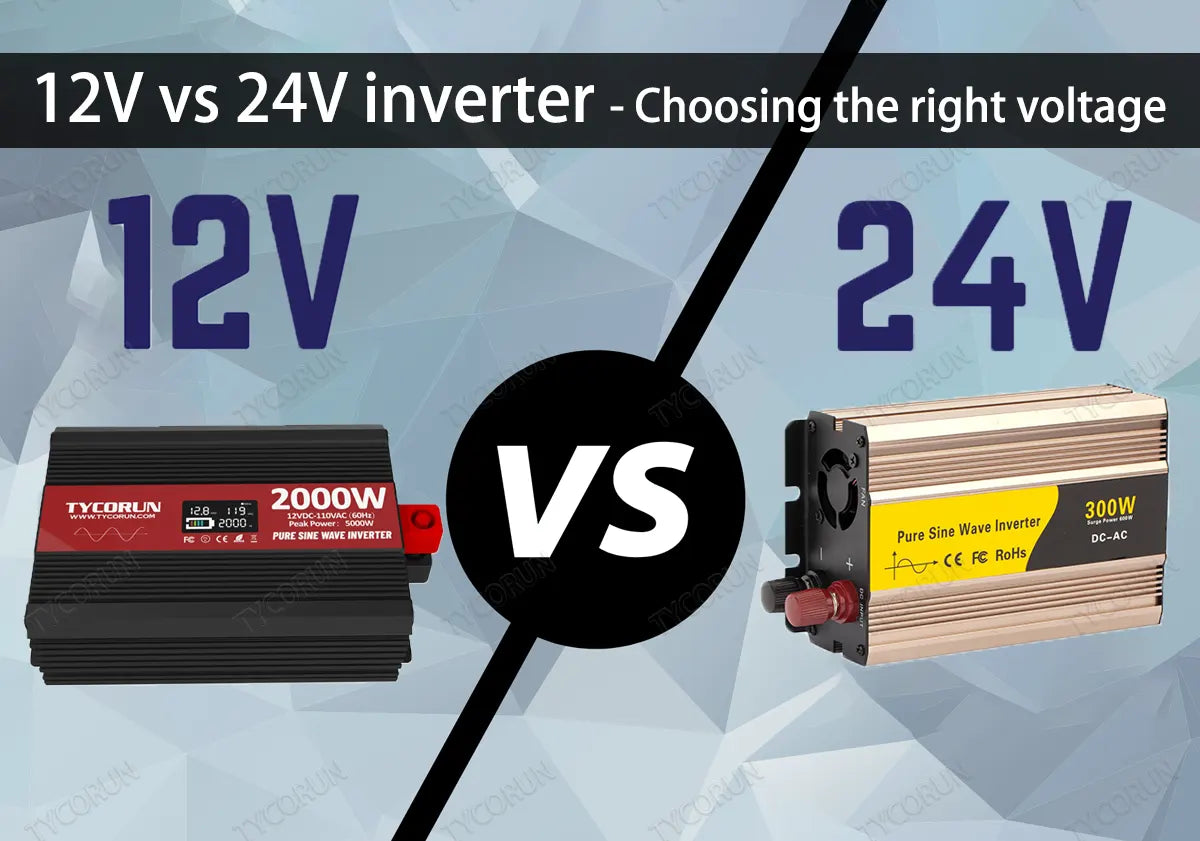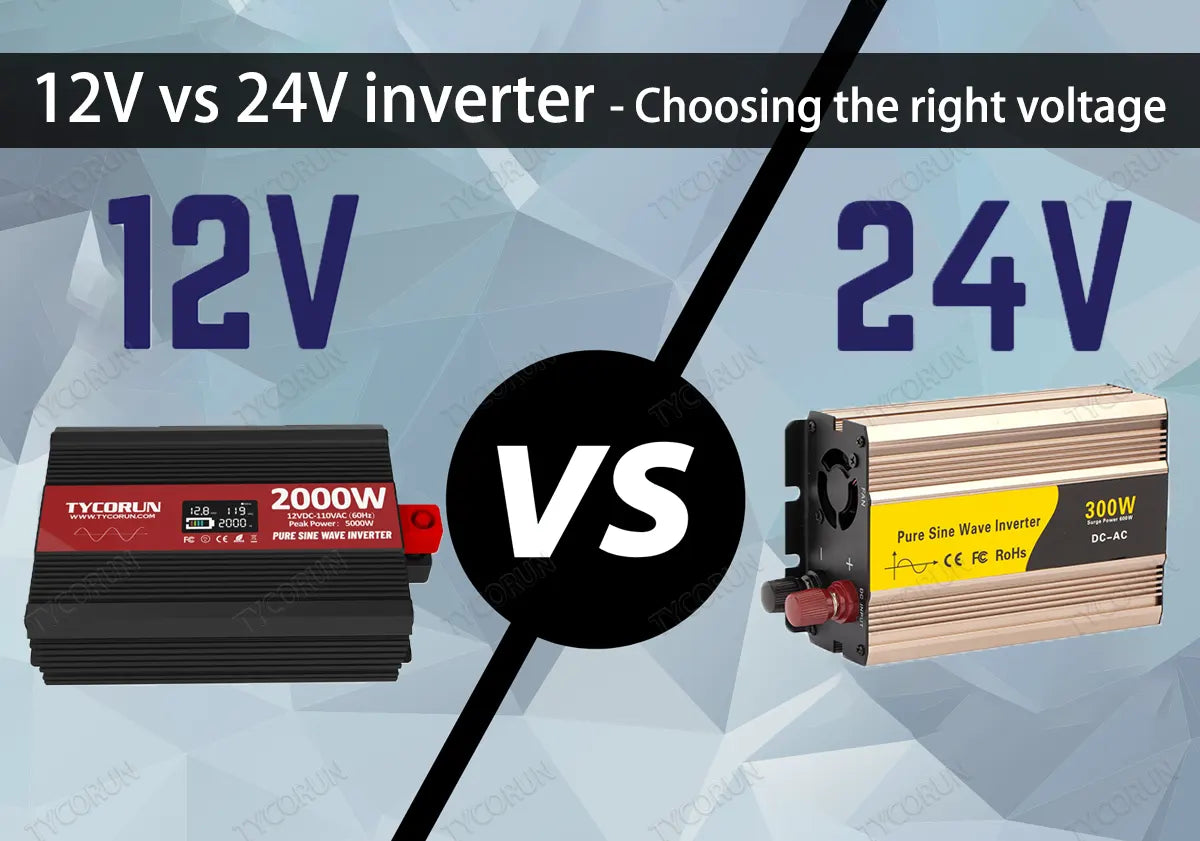
The large-scale growth in photovoltaic market demand has driven the market demand for inverters. According to data, global photovoltaic inverter shipments was 185GW in 2020, and grew to 200GW in 2021. It is expected that by 2025, the global overall market size of inverter shipments will reach 401GW.
Inverters have been widely used in people's lives and work. When using inverters, it is not difficult to find that inverters have different voltage specifications. So what are the differences between 12v vs 24v inverter? Which one should you choose? This article will give you the answer.
Main content:
- What is an inverter
- Main parts of an inverter
- How does an inverter work?
- 12V vs 24V inverter - differences and which is better
- 12V vs 24V inverter - the applications
- 12V vs 24V inverter - the costs
- How to decide whether I should use 12V or 24V inverter?
- Can I use a 12V inverter with a 24V battery?
- Maintenance tips on inverter
- Where do I buy the best 12V inverter?
- FAQs
1. What is an inverter
An inverter is a device tasked with converting Direct Current (DC), as supplied by sources such as batteries or solar panels, into Alternating Current (AC), which is commonly used by most household appliances. The inverter serves as a bridge, allowing these two different types of electrical currents to interact effectively.
2. Main parts of an inverter
An inverter consists of several key components that work together to facilitate the conversion of direct current (DC) into alternating current (AC). These essential parts include:
- DC input: The inverter's primary function is to convert the incoming DC power into AC power.
- Converter: The converter is responsible for transforming the DC input into a high-voltage DC signal.
- Control logic program: Inverters employ sophisticated control logic program to manage the conversion process.
- Output filter: To refine the quality of the AC output, inverters include an output filter.
- AC output: The AC output can be used to supply electricity to various devices and appliances, making it compatible with standard electrical equipment.
- Heat sink: A heat sink is incorporated to dissipate heat and prevent overheating, ensuring the inverter's reliable operation. Protection features: Many inverters come equipped with protection features such as overvoltage protection, overcurrent protection, and temperature monitoring.
- LED display: Real-time display data such as the power, battery status, input voltage and output voltage. Not all inverters come with LED displays, while TYCORUN 3000w inverter uses LCD LED displays, and the accuracy of data display reaches 98%, which is a leading level in the industry.
- Remote control: When the inverter is placed at a high place, the remote control can help users easily operate the inverter. TYCORUN's inverters use radio frequency remote control, and one remote control only corresponds to one inverter to prevent misoperation caused by mixed use.
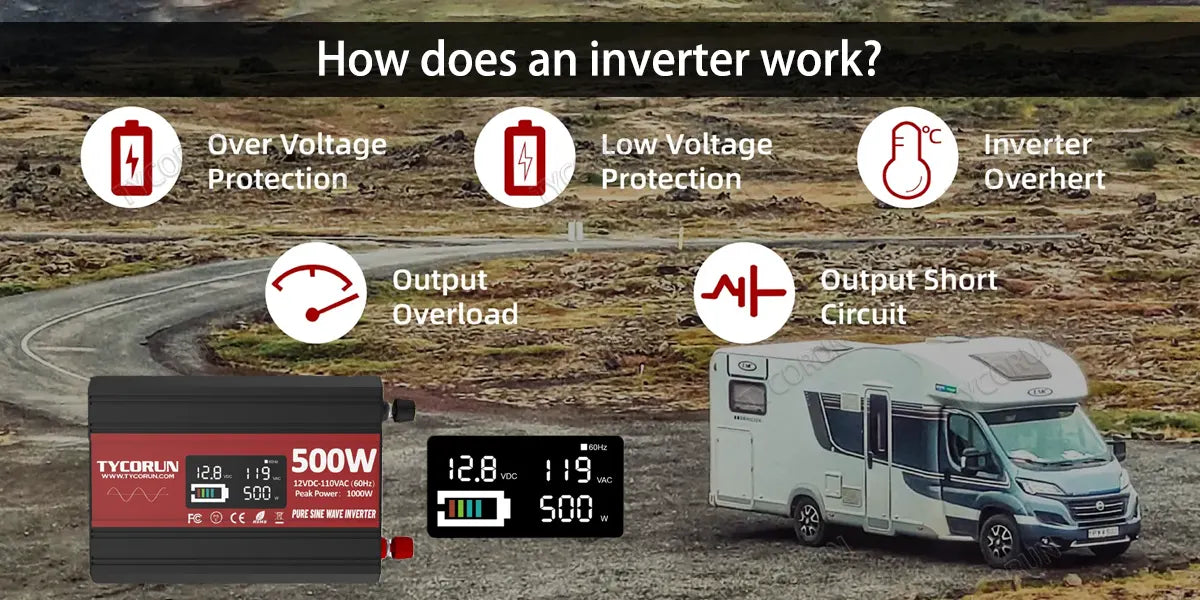
3. How does an inverter work?
An inverter is a electronic device engineered to convert direct current (DC) into alternating current (AC). Its operation can be succinctly described as follows:
- DC input: The inverter initiates its operation by receiving DC power, typically sourced from batteries, or other DC generators. This incoming voltage is essential for the inverter's functionality.
- Converter stage: The DC input voltage is then directed to a converter stage, a pivotal component of the inverter's function.
- Filtering: To enhance the quality of this pulsating DC voltage, the inverter employs an output filter. This filter serves to smoothen any irregularities in the voltage waveform generated during the converter stage.
- Control logic: This control system regulates the timing and duration of the electronic component switching in the converter stage, ensuring that the resulting AC waveform conforms to the desired specifications.
- AC output generation: The processed DC voltage is now poised for conversion into AC. Through the control logic, the inverter activates the electronic components to produce a waveform that matches the AC voltage required to power typical electrical devices and appliances.
- AC output: The ultimate outcome of the inverter's operation is a steady AC power output, ready to power a diverse array of electrical devices and appliances, ensuring compatibility with typical electrical systems.
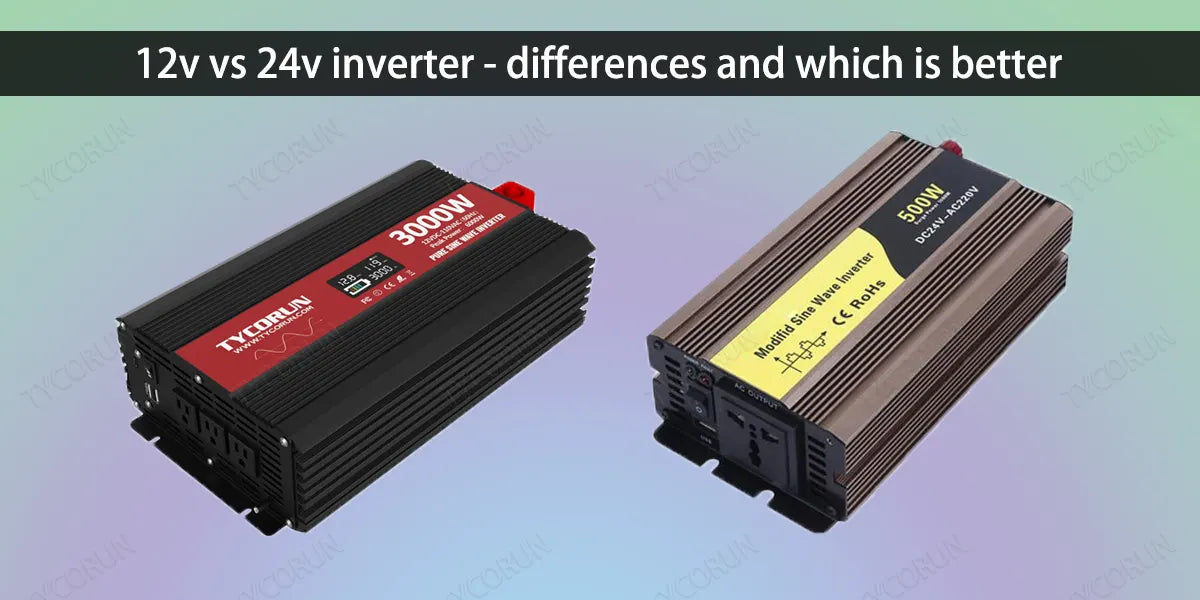
4. 12V vs 24V inverter - differences and which is better
For 12V vs 24V inverters, it's essential to understand the differences between these two conversion systems and determine which one is better suited for your specific needs. Here are some key distinctions:
- Battery: The applicable batteries are different. 12V inverter is for 12V battery, the other is for 24V battery or two 12V batteries connected in series.
- Power handling: 24V inverters tend to handle higher power loads more efficiently. If you require more significant power output, a 24V inverter is the better choice.
- Cost: 12V inverters are often more affordable initially, you should choose according to application needs.
5. 12V vs 24V inverter - the applications
For 12V vs 24V inverters, you can find diverse applications based on specific voltage requirements and power needs. Here's a breakdown of their applications:
Applications of 12V Inverters
- Automotive: 12V inverters are commonly used as power wheels battery in cars, trucks, and recreational vehicles (RVs) to help powering devices like engine, laptops, mobile phones, and small appliances.
- Portable solar systems: They are ideal for small, portable solar setups used for camping, hiking, and off-grid power.
- Emergency power: 12V inverters are handy during power outages and can be used for lights, chargers, and low-power appliances from car batteries.
- Wireless communication: Some wireless communication devices, such as wireless routers, wireless cameras, etc.
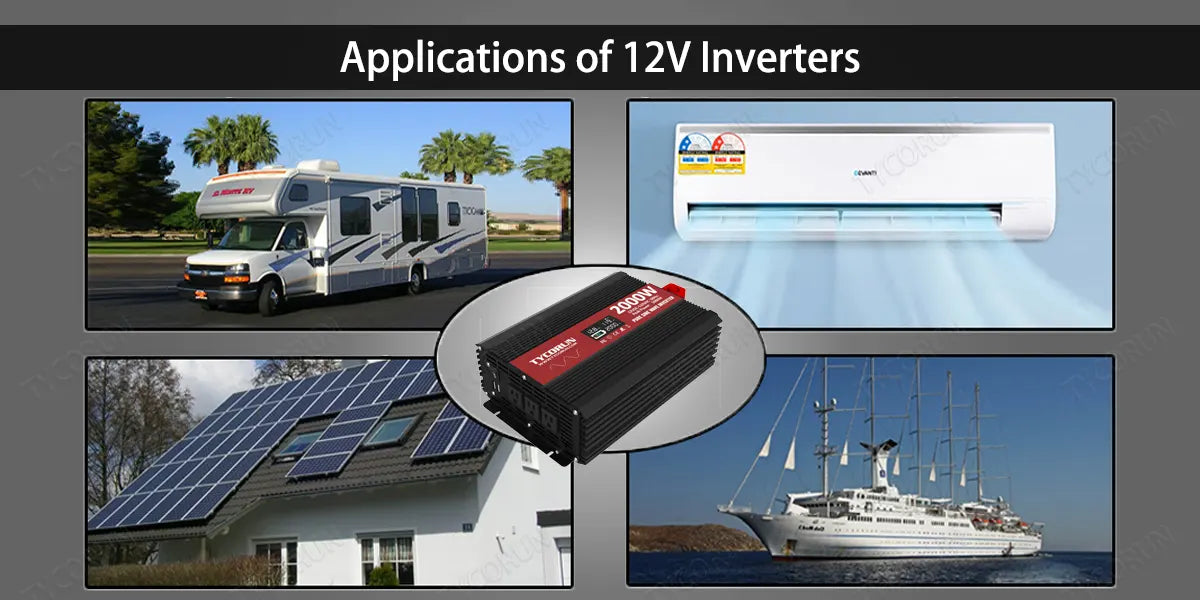
Applications of 24V inverters
- Off-grid homes: When compare 12V vs 24V inverter, 24V inverters are suitable for off-grid homes with larger power demands, efficiently running refrigerators, air conditioners, and power tools.
- Remote telecommunications: In remote communication towers, 24V inverters can work with radio equipment and monitoring systems.
- Industrial use: Manufacturing facilities often use 24V inverters to operate heavy machinery and maintain a stable power supply.
6. 12V vs 24V inverter - the costs
Typically, for 12V vs 24V inverters, in terms of cost, 12V inverters have a lower upfront cost compared to 24V inverters. This makes them a popular choice for budget-conscious consumers.
However, 24V inverters have greater power. If you need to meet the needs of high-power appliances, the cost of purchasing one 24V inverter is more cost-effective than purchasing multiple 12V inverters. When deciding the 12V vs 24V inverter dilemma based on cost, also remember the power requirements of actual application scenarios.
7. How to decide whether I should use 12V or 24V inverter?
For a 12V vs 24V inverter, you need to evaluate your specific needs and circumstances.
- Power demands: If your needs lean toward higher wattage power supply or involve running larger appliances, a 24V inverter may prove to be a better choice due to its enhanced power capacity.
- Efficiency matters: Generally, 24V inverters exhibit superior efficiency, translating to reduced energy wastage during the conversion process. Opting for a 24V inverter aligns with energy-conscious goals.
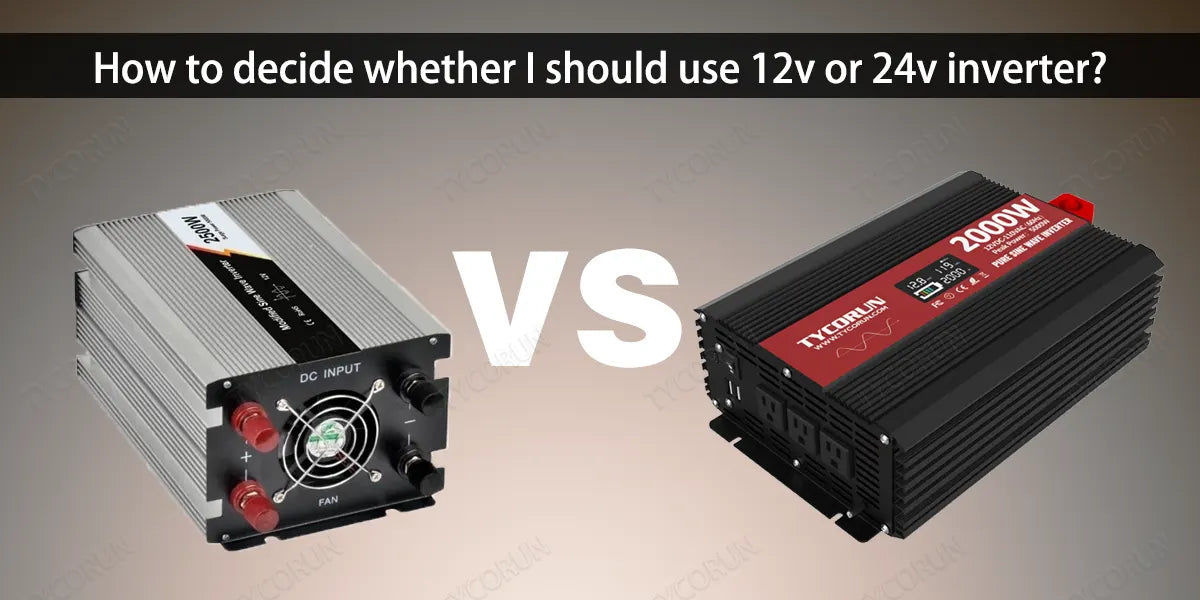
8. Can I use a 12V inverter with a 24V battery?
Combining a 12V inverter with a 24V battery, or vice versa, is strongly discouraged. Voltage disparities can inflict harm upon both the inverter and the interconnected devices. To ensure a secure and efficient power system, it is imperative that the inverter voltage aligns seamlessly with that of the battery.
9. Maintenance tips on inverter
Effectively preserving your inverter is pivotal in upholding its longevity and dependable performance. Here are some key maintenance tips:
- Regular inspection: Routinely scrutinize the inverter for any visible damage, loose connections, or indications of overheating.
- Maintain cleanliness: Maintain cleanliness in the vicinity of the inverter, guarding against dust and debris accumulation that may impede proper ventilation. When cleaning the inverter, care should be taken to avoid water and other chemicals entering the inside of the device. You can use a dry cloth to clean the surface of the device.
- Battery care: If your system is battery-dependent, regularly monitor and maintain the batteries to ensure they remain in optimal condition.
10. Where do I buy the best 12V inverter?
In your quest for a superior 12V inverter, besides checking battery stores near me, TYCORUN emerges as a distinguished brand acclaimed for its consistent production of dependable inverters.
TYCORUN 2000w pure sine wave inverter and other inverter products all comply with ETL safety regulations, have multiple certifications, and have voltage stabilization functions and LCD LED displays that can monitor values in real time. Ensure that your purchase originates from a reliable source like TYCORUN to secure both product authenticity and a robust customer support system.
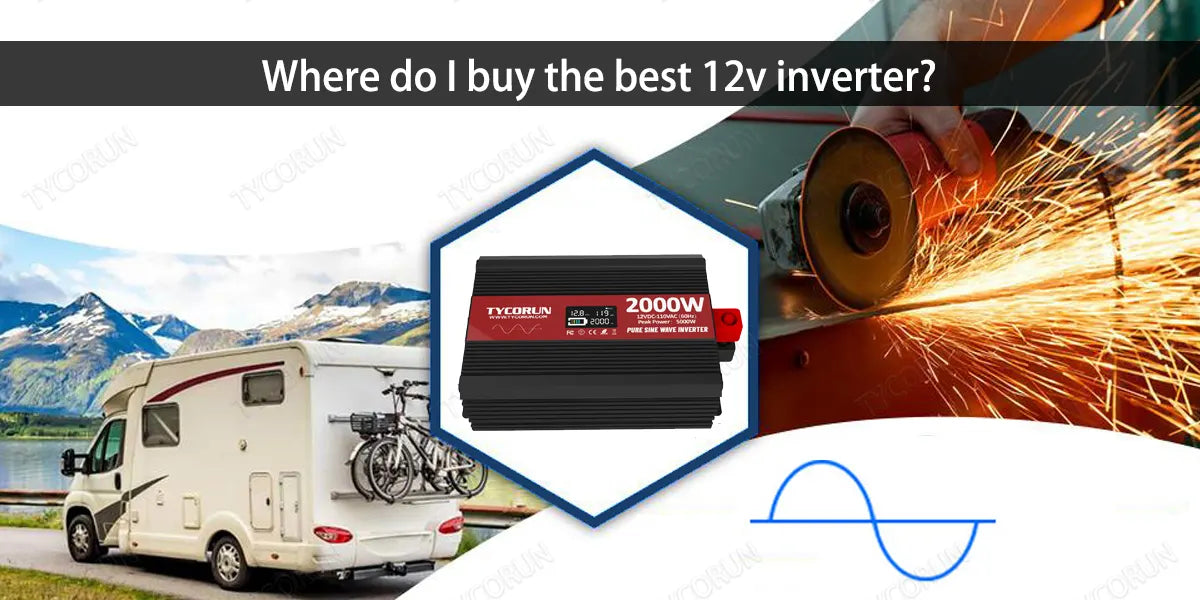
11. FAQs
Can I convert a 12V inverter to 24V?
Converting a 12V inverter to 24V is not a simple task and is almost impossible to achieve. If your electricity demands have shifted, it is usually wiser to obtain the suitable inverter that aligns with your revised voltage requirements.
How many batteries can be connected to the 24V inverter?
In most off-grid and backup power systems, the 24V battery pack can consist of two 12V battery or eight battery cells, and the voltage of the entire battery pack cannot exceed 24V.
Can 24V solar panels work with 12V inverters?
Connecting 24V solar panels to a 12V inverter is not ideal and generally not recommended. The inverter cannot work properly when the voltage does not match, and solar panels cannot be directly connected to the inverter. Because the solar panel cannot stabilize the output voltage and is DC power, the battery must be connected first and then connected to the inverter through the battery.
Tycorun 12V inverters guarantee reliable pure sine wave output with a lower price than other competitors, please check power inverter 3000w, 2000w pure sine wave inverter, power inverter 1000w, 500 w inverter price
Related posts: 12v 100ah lithium ion batteries, Car battery voltage, Trolling motor battery


